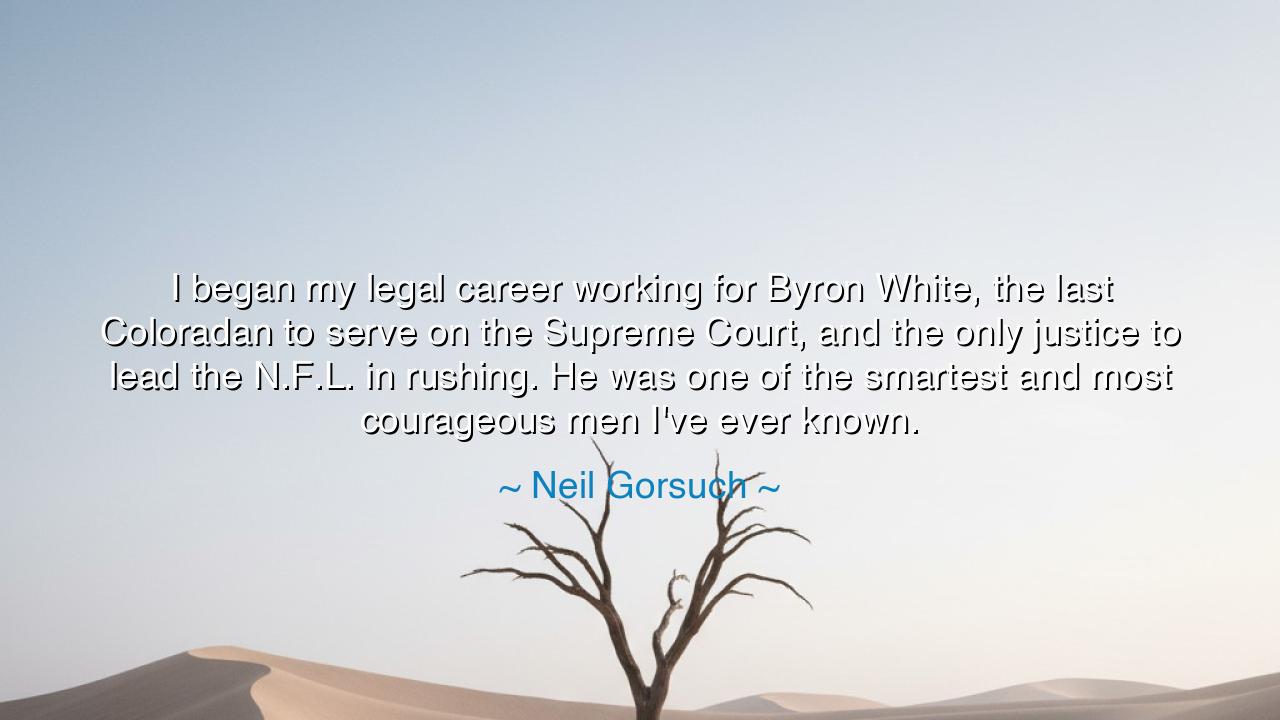
I began my legal career working for Byron White, the last
I began my legal career working for Byron White, the last Coloradan to serve on the Supreme Court, and the only justice to lead the N.F.L. in rushing. He was one of the smartest and most courageous men I've ever known.






The words of Neil Gorsuch resonate with both reverence and admiration: “I began my legal career working for Byron White, the last Coloradan to serve on the Supreme Court, and the only justice to lead the N.F.L. in rushing. He was one of the smartest and most courageous men I've ever known.” Within this sentence lies a reflection not only on personal history but on the timeless relationship between mentorship, excellence, and courage. Gorsuch speaks to the power of guidance, the shaping of character under the tutelage of those whose intellect and valor leave indelible marks on those who follow. In his words, we see the ancient truth: greatness is often forged in the presence of greatness, and the courage to lead in law, life, and sport is inseparable from wisdom.
The origin of this quote lies in Gorsuch’s early career, when he had the privilege of serving as a law clerk for Byron White, a man remarkable not only for his jurisprudence but for his extraordinary life. White’s distinction as a Supreme Court justice who once led the National Football League in rushing is not mere trivia; it symbolizes the rare combination of physical courage, discipline, and intellectual mastery. Gorsuch’s reflection honors a figure who bridged disparate worlds — athletic, legal, and moral — demonstrating that excellence requires mastery across domains, and that courage manifests both on the field and in the courtroom.
Throughout history, great leaders have often emerged under the guidance of mentors whose lives are extraordinary in both action and thought. Alexander the Great tutored under Aristotle, gaining not only knowledge but a model of reasoning and ambition that would guide him to reshape the world. Similarly, Gorsuch learned from White not only the rigors of legal reasoning but also the embodiment of courage and resilience — lessons that no book or lecture alone could convey. Mentorship is thus revealed as a sacred conduit through which skill, judgment, and moral fortitude flow from one generation to the next.
White’s dual legacy — as a Supreme Court justice and a sports champion — reflects the holistic nature of human excellence. In ancient Greece, citizens were celebrated for harmonizing mind and body, cultivating intellect, strength, and virtue in equal measure. Gorsuch’s reverence captures this spirit: to serve justice well, one must be fearless in thought and action, prepared to navigate both intellectual and practical challenges. Courage, he implies, is not the absence of risk, but the disciplined confrontation of it, whether in debate, on the field, or before the highest courts.
There is also a lesson in White’s humility and dedication. Though his achievements were remarkable, Gorsuch emphasizes that it was White’s character — his intelligence and courage — that left the deepest impression. History is full of the powerful who wielded knowledge without honor, skill without integrity. White’s life, however, embodies the principle that true greatness is inseparable from virtue, and that the admiration of others flows not from titles alone, but from the courage to live rightly in every arena.
Gorsuch’s reflection also highlights the profound influence of example. Just as a young Athenian might model himself on Socrates or Pericles, Gorsuch absorbed not only legal technique but the ethos of principled leadership. White’s life demonstrates that excellence is lived, not merely learned; courage is enacted, not merely preached. Each decision, each game, each ruling, becomes a lesson in how to balance intellect, ethics, and personal bravery — a lesson that transcends the individual to guide generations.
The enduring truth, then, is that the mentors we encounter shape the lens through which we view the world. To walk alongside a figure like Byron White is to witness the integration of skill, judgment, and valor, and to understand that leadership requires more than intelligence: it demands courage, humility, and a willingness to act upon principle. The lesson is universal: seek mentors of integrity, learn from those who embody excellence in multiple dimensions, and let their example elevate not only your ability, but your character.
Thus, let the words of Neil Gorsuch endure as wisdom for all who aspire to greatness: cultivate courage in thought and action, honor the guidance of those who have walked before you, and recognize that the measure of a life well-lived is not in titles or statistics, but in the steadfastness of the mind, the bravery of the heart, and the inspiration left for those who follow. In this, we see the timeless echo of the ancients: that virtue, intelligence, and courage together create leaders whose influence is immortal.






AAdministratorAdministrator
Welcome, honored guests. Please leave a comment, we will respond soon